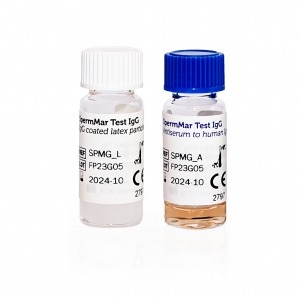SpermMar Test IgG
Test for the detection of anti-sperm antibodies
As sperm does not come into contact with the blood circulation, the male reproductive system contains no antisperm antibodies in normal conditions. However, when the blood-testis barrier is breached, the immune system can detect mature sperm as antigenic and form antisperm antibodies that cause sub- or infertility. Antisperm antibodies belong to two immunological classes: immunoglobulin (Ig)A and IgG antibodies, and can be present in the semen sample as well as in male blood serum. In addition, antisperm antibodies are sometimes also found in blood serum of women. Antisperm IgG antibodies are clinically associated with immunological infertility, and screening can therefore provide help in assessing couple’s infertility.
The SpermMar Test IgG is a semi-quantitiative, non-automated, diagnostic kit for detecting antisperm antibodies of the IgG class on spermatozoa in human semen or serum. It is a rapid, easy-to-use microscopic test with an intended testing population of infertile couples.
The test can be performed on fresh, untreated human semen sample when applying the direct SpermMar Test IgG, or on human blood serum (from men and women) when using the indirect SpermMar Test IgG. The SpermMar Test IgG may help in assessing the diagnosis and management of couple infertility.
SpermMar Test IgG has an 18 month shelf life from production date. Information about the composition of the product can be found in the material safety data sheet.
Directe SpermMar IgG
Indirecte SpermMar IgG
SpermMar IgG controle
Regulatory
Europe: CE-marked (IVDR, Notified Body number 2797)
USA: registered – Canada: Health Canada license
Brazil: registered – Australia: registered
Product order codes
SPMG_S : SpermMar Test IgG – Single kit – 50 tests
SPMG_C : SpermMar Test IgG – Complete kit – 50 tests
SPMG_P : SpermMar Test IgG – Positive control
SPMG_N : SpermMar Test IgG – Negative control
The immunological factor reduces the probability of spontaneous conception, and this is particularly true when ASA of the IgA class are also present

